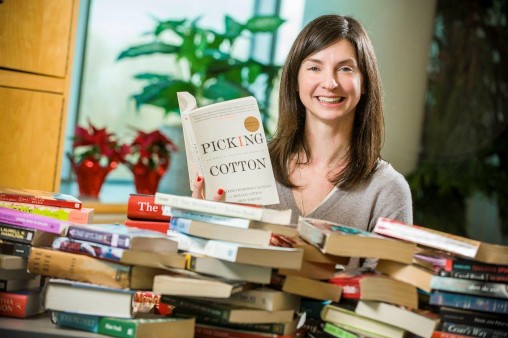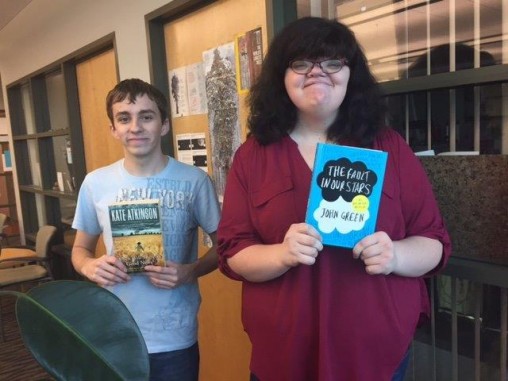
English instructor Carolyn Stoermer, pictured, worked with the English Club and Cheryl Meyer, a professor in the School of Professional Psychology, to collect books for the Ohio Reformatory for Women in Marysville. (Photos by Chris Snyder)
Inmates at the Ohio Reformatory for Women in Marysville have a reading room bristling with donated books thanks in large part to a Wright State University psychology professor who supervises a class at the prison.
Through the efforts of Cheryl Meyer, a professor in the School of Professional Psychology, thousands of books have been delivered to the prison over the years.
And now, a new service project by the English Club at Wright State promises to balloon the prisoners’ collection even more. Dozens of new books bought from the English Club’s used-book sales are being sent to the prison, which houses more than 2,600 inmates.
“The lack of access to books for these inmates due to cutbacks in prison funding is concerning. Reading and literacy can transform lives, so it’s good that our students have committed to getting them these books,” said Carol Loranger, chair of the Department of English Language and Literatures in the College of Liberal Arts. “It’s part of English Club’s commitment to get everybody reading.”
The English Club has about 150 members, including students from various colleges and faculty, staff and alumni. Its mission is to promote the love of reading and studying literature and writing at Wright State and in the community.
Inspiration for the book project came from Meyer. In 2012, Meyer, who teaches a class in forensic psychology, took some students to the prison to meet with a panel of women serving life sentences.
“With the help of a psychologist at the prison, I arranged for my students to teach life-span development to women serving life sentences,” said Meyer, who has co-authored an article “Inmate Education as a Service Learning Opportunity for Students” that has been accepted for publication. “I supervise and they teach.”
During the course of teaching at the prison, the inmates indicated that they had limited access to books and wanted to start a reading room.
So Meyer began by collecting books donated by the library in Yellow Springs — one to two boxes a month. She picked up more books at yard sales and then began collecting books among those left over following sales by the Wright State English Club.
Meyer also occasionally solicited books through campus email announcements, receiving donations from faculty, staff and others university-wide.
Meyer goes through each box of donated books, weeds out inappropriate or irrelevant offerings such as cookbooks and travel guides, and repacks. Once she has about a dozen boxes, she delivers them to the prison warehouse.
The books are then taken to the reading room and sorted by the librarian. Children’s books go to the visiting areas or mother-infant program, textbooks go to the prison school, and outdated magazines go to the art program. The rest find a home in the reading room.
“The reading room is about the size of a small conference room and is as organized as any library I have ever seen, and it functions like a library,” Meyer said. “One woman pretty much runs it. Clearly the patrons are thrilled, and the inmate who runs it benefits as well.”

From left, students Dylan Ward and Courtney Cattell worked with English instructor Carolyn Stoermer to purchase books for the prison using proceeds from the English Club’s used-book sale. (Contributed photo)
When Meyer learned that the English Club had surplus funds for a service project, she contacted the reading room librarian at the prison and was told the inmates would love to have a few new books from certain authors or genres. Meyer passed along the list to the English Club.
“Their wish list was incredibly modest,” said instructor Carolyn Stoermer, the club’s faculty adviser. “There were specific authors that they wanted — Nicholas Sparks, Jodi Picoult. They also like romance novels, particularly supernatural romance. The ‘Hunger Games’ trilogy was a request. They also wanted a Robert Frost poetry anthology.”
The collection of books in Wright State’s donation includes such works as “The Chronicles of Narnia” by C.S. Lewis, “Plain Truth” by Jodi Picoult, “A Piece of Cake” by Cupcake Brown, “The Girl Who Played With Fire” by Stieg Larsson and “The Man Who Outgrew His Prison Cell” by Joe Loyla.
The inmates requested several books that were redemption stories about people who went to jail and used the experience to turn their lives around.
“My impulse would be that if they are in prison, maybe they don’t want to read about prison. But those were the specific requests,” said Stoermer. “That shows me these women are going to use reading as a way to process what they’re going through. I can’t think of a better way to spend English Club money than to help people understand their world through books.”
Plans are for the prison book donation to be an annual service project.
The collection from Wright State are books that were purchased from sale proceeds and a few donated books from Wright State faculty and staff. Stoermer and two students — English major Dylan Ward and nursing major Courtney Cattell — went book shopping together, spending about $300.
They bought a few books that weren’t on the inmates’ list, but ones they thought the prisoners would like and could use. They bought books about dog training because the prison has a dog-training program and books about the treatment of certain medical conditions.
“These women would be diagnosed with something, but they have no access to the Internet,” Stoermer said. “So they wanted reference books. Stuff about diabetes or depression or anxiety.”
Book shopping for the inmates was an education for the students because they had to carefully consider the audience before settling on a book.
“Not every book about depression is appropriate for women in prison,” Stoermer said. “If the book says, ‘Oh, you’re sad. Go watch a movie or go try a new restaurant.’ That’s not going to be something they can use. So the students really had to look at the books through that lens and put themselves in those readers’ positions.”
Stoermer and the English Club champion the importance of reading.
“Books exist as an artifact of the culture that creates them. If you are reading and thinking about these books, you are not just thinking about the plot and the characters; you are also thinking about your own culture,” said Stoermer. “So you are learning about other people and at the same time learning about yourself. If you’re interested in educating yourself in any way, you should be reading.”

 Walking through open doors
Walking through open doors  Adventures await
Adventures await  Wright State to expand nursing facilities to meet workforce needs and prepare more graduates for in-demand careers
Wright State to expand nursing facilities to meet workforce needs and prepare more graduates for in-demand careers  Wright State student-athletes make a lasting impact on local family with more to come
Wright State student-athletes make a lasting impact on local family with more to come  Wright State names Rajneesh Suri dean of Raj Soin College of Business
Wright State names Rajneesh Suri dean of Raj Soin College of Business 